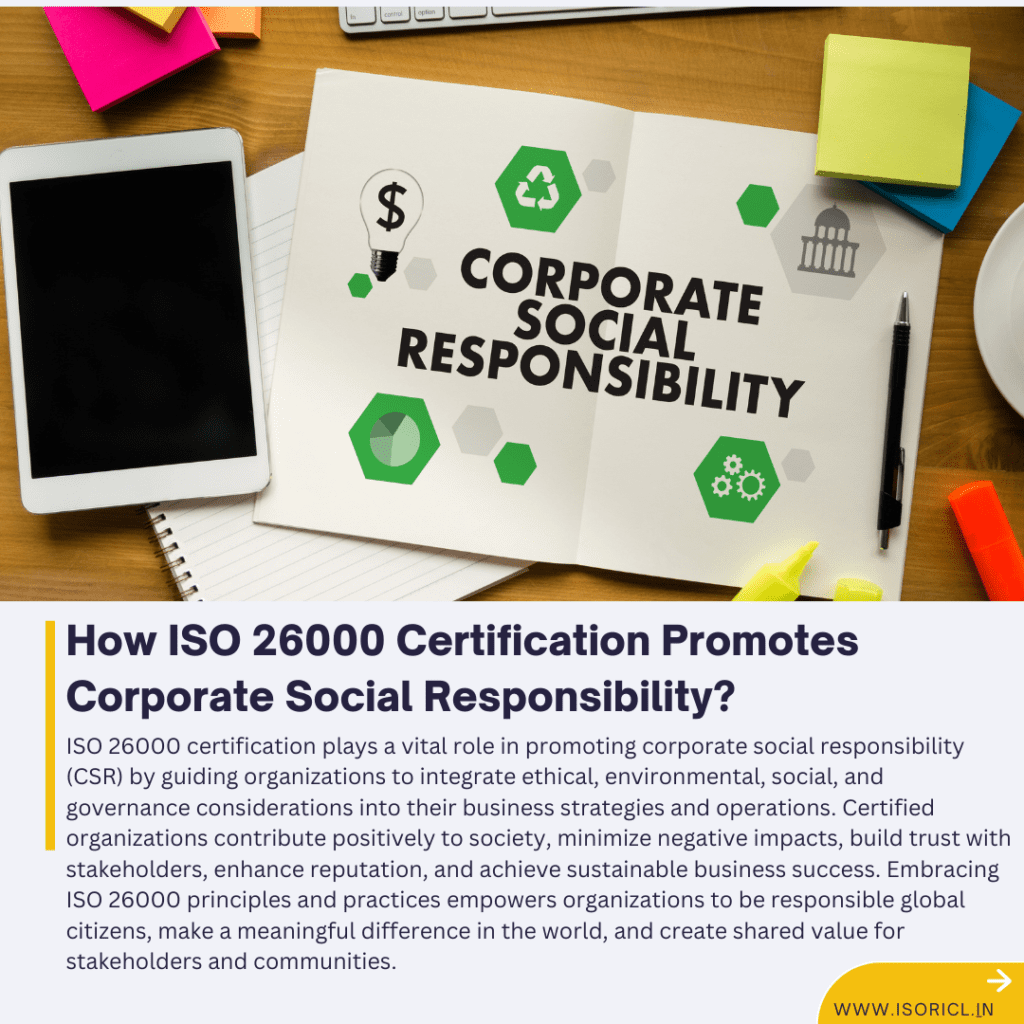How ISO 26000 Certification promotes corporate social responsibility?

ISO 26000 provides guidance on social responsibility for organizations, aiming to promote sustainable practices that benefit society, the environment, and stakeholders. While ISO 26000 does not provide certification like other ISO management standards, it offers valuable frameworks and principles for organizations to integrate corporate social responsibility (CSR) into their operations. Here’s how ISO 26000 promotes CSR:
1. Core Principles of Social Responsibility
Accountability: Organizations are encouraged to take responsibility for the impacts of their decisions and activities on society, the environment, and stakeholders. They should be transparent about their practices and decisions.
Transparency: Promotes openness and disclosure regarding social, environmental, and economic performance. This includes communicating information about policies, practices, impacts, and outcomes related to CSR initiatives.
Ethical Behavior: Emphasizes ethical behavior, integrity, and respect for human rights in all aspects of business operations, including relationships with stakeholders, suppliers, customers, and communities.
2. Integration into Organizational Practices
Stakeholder Engagement: Encourages organizations to engage with stakeholders, including employees, customers, communities, and NGOs, to understand their concerns, expectations, and interests related to social responsibility.
Sustainable Development: Supports organizations in contributing to sustainable development goals by addressing environmental challenges, promoting sustainable consumption and production patterns, and minimizing adverse impacts.
Human Rights: Promotes respect for human rights within organizational activities and supply chains. Organizations are encouraged to identify and address human rights risks and impacts, ensuring fair treatment of all individuals.
3. Benefits of Implementing ISO 26000 Principles
Enhanced Reputation: Organizations that align with ISO 26000 principles build trust and credibility with stakeholders, enhancing their reputation as socially responsible entities committed to ethical business practices.
Risk Management: Helps organizations identify and manage risks associated with social, environmental, and governance issues. Proactive CSR initiatives can mitigate risks related to regulatory compliance, reputation damage, and operational disruptions.
Competitive Advantage: Differentiates organizations in the marketplace by demonstrating a commitment to sustainability, ethical conduct, and social responsibility. This can attract socially conscious consumers, investors, and partners.
4. Promotion of Fair Operating Practices
Anti-Corruption Practices: Encourages organizations to implement anti-corruption policies and practices, promote transparency in business dealings, and adhere to ethical standards in financial transactions and interactions with public officials.
Fair Competition: Advocates for fair competition, integrity in business relationships, and adherence to laws and regulations governing competition and market practices.
5. Community Engagement and Development
Community Investment: Supports organizations in contributing positively to communities where they operate through philanthropic activities, community development projects, and partnerships with local stakeholders.
Education and Awareness: Promotes education and awareness initiatives on social responsibility among employees, suppliers, customers, and the broader community. This fosters a culture of responsible citizenship and engagement.
Conclusion
While ISO 26000 does not provide certification, its guidance promotes corporate social responsibility by encouraging organizations to adopt ethical practices, respect human rights, engage stakeholders, and contribute to sustainable development. By integrating ISO 26000 principles into their operations, organizations can enhance their reputation, manage risks effectively, gain competitive advantage, and make meaningful contributions to societal well-being and environmental stewardship. ISO 26000 serves as a valuable framework for organizations committed to achieving long-term sustainability and creating shared value for all stakeholders involved.

ISO 22000
Food Safety Management System

HACCP
Hazard Analysis and Critical Control Points

FSSC 22000
Food Safety Management Certification Scheme

ISO 22301
Business Continuity Management Systems

ISO 13485
Quality Management For Medical Device

ISO/IEC 27001
Information Security Management System

ISO 20000-1
Information Technology Service Management

ISO 42001
Artificial Intelligence Management System

ISO 41001
Facility Management System

ISO 21001
Educational Organizations Management System

IATF 16949
Quality Management For Automotive

TL 9000
Quality Management System for Telecom

AS 9100
Quality Management for Aerospace Industry

ISO 30000
Ship Recycling Management System

ISO 55001
Asset Management System





